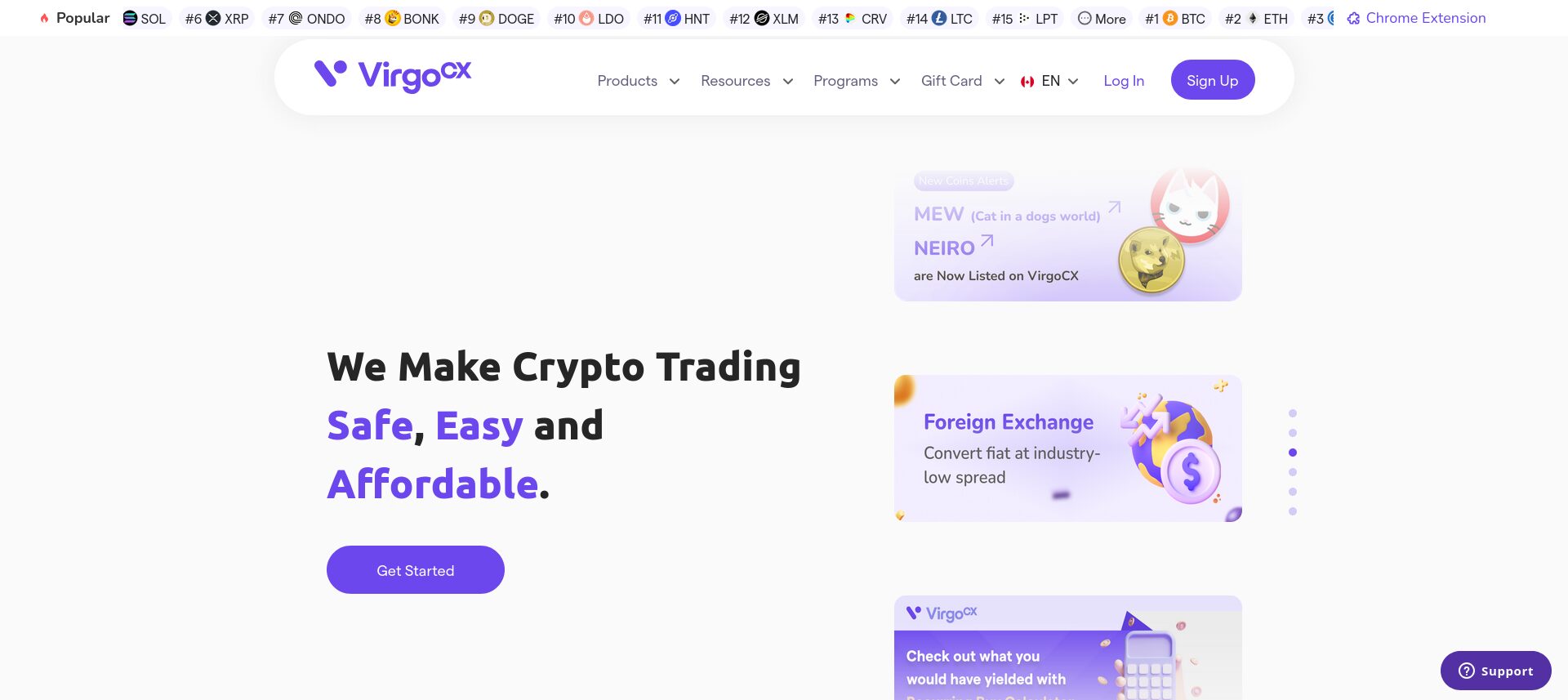Note: AGR Technology may receive a commission on sales generated by partner links on this page, but this has no bearing on opinions or evaluations and is at no cost to you. Please consult an authorised financial adviser if you are unsure whether investing is right for you or which investments are right for you.
Best Crypto Exchanges in Canada: Top 5 Platforms for Trading in February 2026
Navigating the world of cryptocurrency trading in Canada requires finding the right exchange that balances security performance and compliance. With the Canadian government’s progressive stance on blockchain and digital assets traders have access to a diverse range of platforms designed to meet various investment needs.
Quick takeaway:
The crypto exchange landscape offers multiple options for Canadian investors from local platforms to international exchanges. Key considerations include regulatory compliance transaction fees security measures and the variety of cryptocurrencies supported. Whether you’re an experienced trader or just starting your digital asset journey selecting the right exchange can significantly impact your trading success and investment strategy.
As the cryptocurrency market continues to evolve Canadian traders need reliable platforms that provide robust features competitive pricing and strong security protocols. This guide will explore the top crypto exchanges available in Canada helping investors make informed decisions in the dynamic world of digital assets.
1) Bitbuy

Bitbuy is a Canadian cryptocurrency exchange that provides an easy and secure way to buy, sell, and trade digital assets. Established in 2016, it is one of Canada’s most well-known exchanges, offering primarily to Canadian users with a variety of services suited to the local market. Bitbuy accepts a variety of payment methods and provides both a simple and professional trading interface to accommodate different user experience levels.
Key features:
- Supports Bitcoin, Ethereum, and Litecoin, as well as Canadian currency (CAD) deposits and withdrawals using Interac, e-Transfer, and wire transfer
- Basic and professional trading alternatives for beginners and skilled users
- 24/7 client support
- Protection for platform-held funds through digital asset insurance
Pros:
- Easy-to-use interface suitable for beginners
- Strong customer support with live chat
- Competitive fees on certain trades
- Quick and reliable CAD deposits/withdrawals
- Mobile app for convenient trading on the go
Cons:
- Limited range of altcoins compared to global exchanges
- Higher fees for some transactions, particularly on smaller trades
- Limited advanced trading features (e.g., margin trading)
- No staking options for certain cryptocurrencies
Website screenshot:
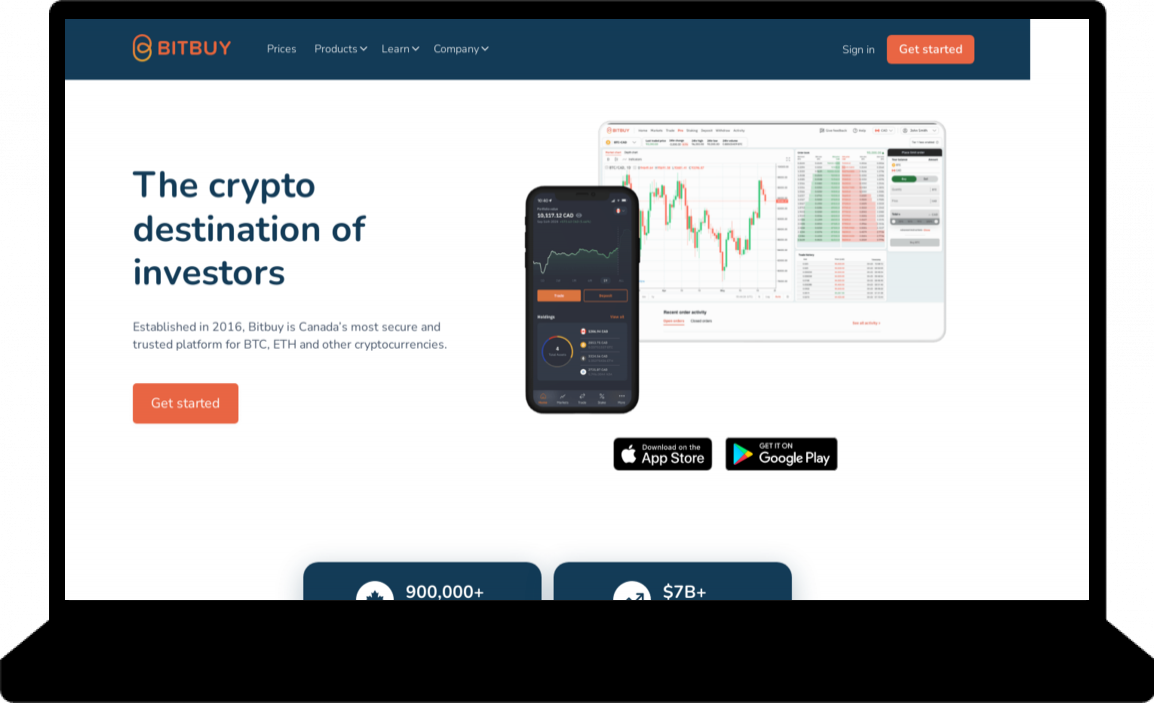
2) Virgo CX

VirgoCX is a Canadian cryptocurrency exchange that provides a platform for buying, selling, and trading various digital assets. It is specifically developed for Canadian users, with features like as CAD support, seamless connectivity with Canadian banking systems, and an easy-to-use interface. The exchange offers a number of cryptocurrencies, including Bitcoin, Ethereum, and stablecoins, with a focus on regulatory compliance and security.
Key features:
- The Canadian dollar (CAD Support: CAD direct deposits and withdrawals by Interac e-Transfer, wire transfer, and EFT
- User-Friendly Interface: Simplified design for both new and experienced traders
- Security includes two-factor authentication (2FA) and cold storage for the bulk of assets
- Supports a wide range of cryptocurrencies, including Bitcoin, Ethereum, and Litecoin
- Regulatory Compliance: Fully registered and regulated under Canadian financial regulations
3) Coinbase

Key features:
- Ideal for cryptocurrency beginners
- Covers 150 different cryptocurrencies
- Trading fees around 0.60%
- High-security standards
- Intuitive user interface
Pros:
- The UI is simple and straightforward to use for beginners.
- Industry-leading encryption and security technologies.
- Coinbase Earn program allows trading of over 246 cryptocurrencies and tokens while also providing educational content.
Cons:
- Fees are greater than other cryptocurrency exchanges.
- Coinbase users have reported excessive wait times for customer assistance, as well as unexpected account limits.
Website screenshot:
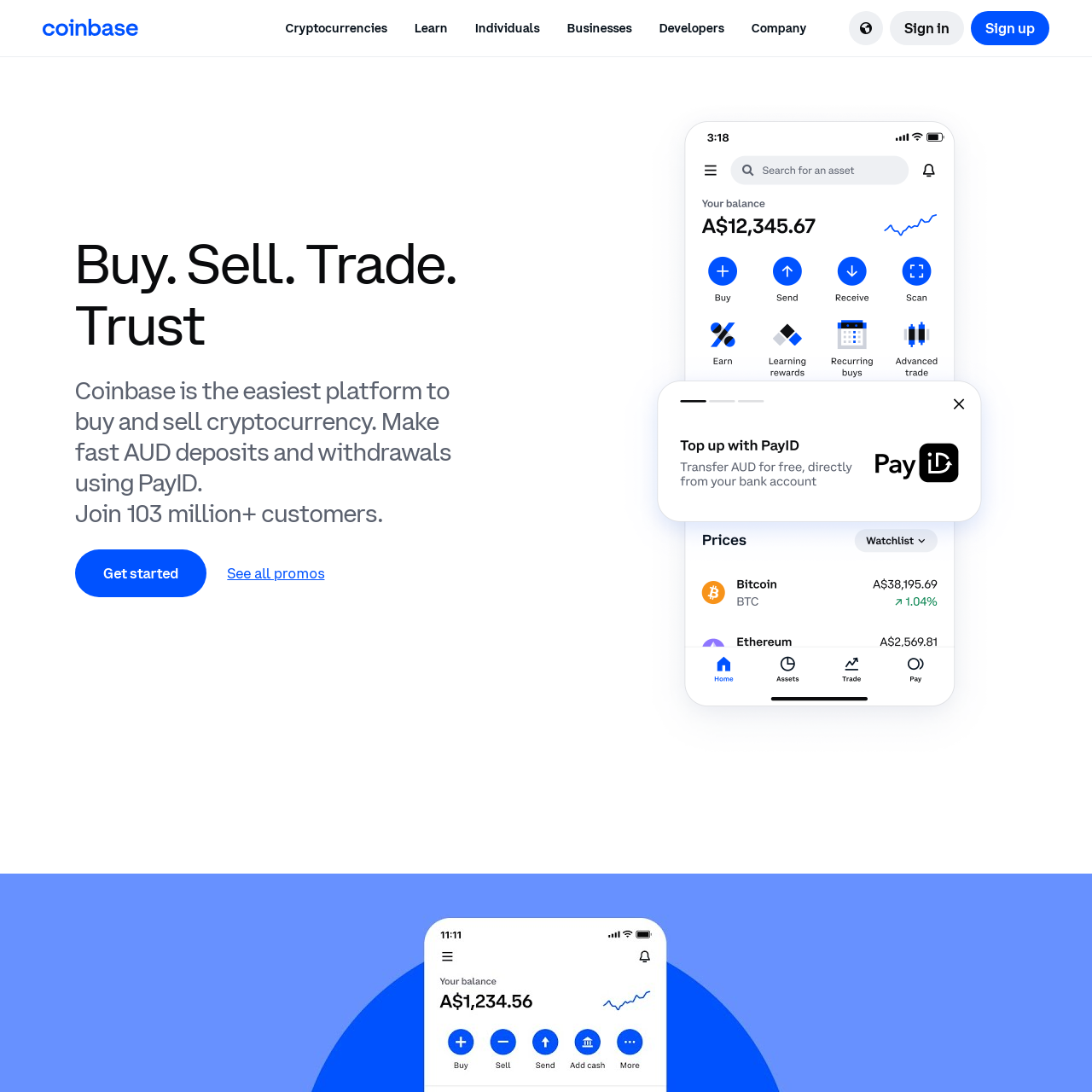
4) Shakepay
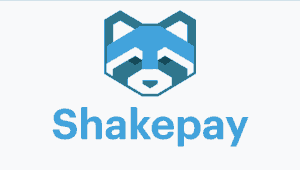
Shakepay, a cryptocurrency exchange established in Canada, allows customers to purchase, sell, and keep Bitcoin and Ethereum. It is intended for Canadian users, with an emphasis on simplicity and ease of use. The platform accepts CAD deposits and withdrawals via Interac e-Transfer and bank wire.
Key features:
- Cryptocurrencies supported include Bitcoin (BTC) and Ethereum (ETH)
- Deposit methods: Interac e-transfer, bank wire
- Withdrawal Options: Interac e-Transfer, bank wire
- Fees: Spread-based pricing (no extra fees for deposits or withdrawals)
- User Interface: Simple and beginner-friendly
- Security: Two-factor authentication (2FA)

5) Avatrade
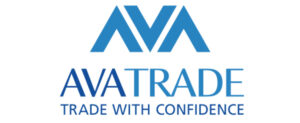
AvaTrade is recognized as one of the top Cryptocurrency exchanges supporting Canadian users and global customers, offering a platform for traders to engage in crypto trading. AvaTrade distinguishes itself as a CFD (Contract For Difference) broker, offering access to a diverse range of over 800 markets. This includes opportunities to trade in forex, stocks, commodities, indices, ETFs, bonds, and cryptocurrencies, providing traders with ample options to diversify their portfolios and pursue their investment goals.
With a wide range of products, including forex, indices, shares, ETFs, commodities, and cryptocurrencies, AvaTrade caters to the needs of both beginner and experienced traders. Additionally, it has earned recognition as one of the best online trading platforms in Canada, offering reliable services and favorable trading platforms.
Pros
-
Trade over 19,000 assets across diverse markets
-
Multi-regulated security
-
User-friendly platform for trading
-
Top-rated trading experience on both web and mobile platforms
-
Comes with social trading features
- Has options for different types of trading beyond just Cryptocurrency
Cons
-
Requires a $100 minimum deposit requirements to start trading
-
Fewer advanced features
- Doesn’t have functionality for Cryptocurrency wallets to buy and hold Crypto assets can only be used for trading
Website screenshot:

6) Crypto.com

Crypto.com is a popular cryptocurrency exchange known for its mobile-first approach and user-friendly app. The platform is designed to be easy for beginners, making it a great option for those new to cryptocurrency trading.
One of the key features of Crypto.com is its online crypto exchange, which provides users with a more in-depth crypto trading platform experience. The platform allows users to buy, sell, and hold over 200 cryptocurrencies, including the Australian-dollar-based stablecoin TAUD.
Getting started with Crypto.com is simple. Users can download the app and link a credit card or bank account to start buying and selling cryptocurrencies. The platform also offers a straightforward way to buy, sell, and hold cryptocurrencies, making it easy for beginners to navigate.
Key features:
- Online crypto exchange for in-depth trading
- Support for 200+ cryptocurrencies
- TAUD stablecoin support
PROS
- Best platform for beginners
- User-friendly interface and mobile app
- Holding over 200 cryptocurrencies
- Supports TAUD, an Australian-dollar-based stablecoin
CONS
- It charges higher trading fees unless you hold and use CRO
- Poor customer support
- The trading pairs are limited
Website screenshot:

Best Crypto Exchanges in Canada: A Comprehensive Guide

Navigating the Canadian cryptocurrency landscape requires selecting the right trading platform that balances security, functionality, and regulatory compliance. Traders can choose from multiple exchanges that offer unique features tailored to different investment strategies and experience levels.
Key Considerations for Selecting a Crypto Exchange
- Regulatory Compliance
- Verify the exchange’s adherence to Canadian financial regulations
- Ensure platform is registered with appropriate Canadian financial authorities
- Check for transparent operational practices and investor protections
- Security Measures
- Evaluate cold storage capabilities
- Review two-factor authentication protocols
- Assess insurance coverage for potential digital asset losses
- Investigate historical security track record
- Transaction Fees
- Compare trading commission rates
- Analyze deposit and withdrawal fee structures
- Consider volume-based pricing tiers
- Examine hidden cost potential
- Cryptocurrency Support
- Check total number of supported digital assets
- Review availability of major and emerging cryptocurrencies
- Assess trading pairs and liquidity levels
- Verify frequency of new coin additions
- User Experience
- Evaluate platform interface intuitiveness
- Review mobile and desktop trading capabilities
- Check customer support responsiveness
- Analyze educational resources for new traders
Important Trading Considerations
Traders must prioritize platforms offering:
- Transparent pricing models
- Robust security infrastructure
- Comprehensive cryptocurrency support
- Seamless Canadian dollar integration
- Responsive customer service
Understanding Cryptocurrency Exchanges in Canada
Cryptocurrency exchanges serve as digital marketplaces where Canadians can buy, sell, and trade digital assets with ease and security. These platforms have become increasingly important for investors looking to participate in the growing digital currency ecosystem.
What Are Cryptocurrency Exchanges?
A crypto exchange is an online platform that enables users to trade cryptocurrencies like Bitcoin and Ethereum for traditional currencies or other digital assets. Unlike traditional stock exchanges, these digital platforms operate 24/7, allowing instant transactions across multiple cryptocurrencies. Key features typically include:
- Real-time price tracking
- Secure wallet storage
- Multiple trading pairs
- Instant buy/sell functionality
- Price comparison tools
Types of Crypto Exchanges
Canadian cryptocurrency exchanges come in three primary models, each with unique characteristics:
- Centralized Exchanges (CEX)
- Operate like traditional financial institutions
- Regulated by Canadian authorities
- Offer high liquidity and diverse trading options
- Examples include Bitbuy and Kraken
- Decentralized Exchanges (DEX)
- Enable peer-to-peer trading directly from user wallets
- Eliminate intermediaries
- Prioritize user privacy and fund control
- Provide direct wallet-to-wallet transactions
- Hybrid Exchanges
- Combine features of centralized and decentralized platforms
- Balance regulatory compliance with user privacy
- Offer enhanced security and trading flexibility
- Platforms like NDAX demonstrate this approach
Legal Landscape for Crypto Trading in Canada
Cryptocurrency is legal in Canada, with clear regulatory frameworks governing digital asset trading. Key legal considerations include:
- Cryptocurrencies are recognized as digital assets
- Not considered legal tender
- Taxable under capital gains or business income rules
- Regulated by Canadian Securities Administrators (CSA)
- Platforms must comply with financial regulations
- Transactions require proper documentation and reporting
Canadians should choose exchanges registered with securities regulators and understand the tax implications of their crypto trading activities.
Key Factors to Consider When Choosing a Crypto Exchange

Selecting the right cryptocurrency exchange can make or break your digital asset trading experience. Here are the critical factors Canadian investors should evaluate before committing to a platform.
Security Features
Security stands as the paramount concern for crypto traders. Top-tier exchanges implement multiple layers of protection including:
- Two-Factor Authentication (2FA): Adds an extra verification step beyond password login
- Cold Storage: Keeps majority of assets offline to prevent potential hacking attempts
- Insurance Coverage: Protects user funds against potential security breaches
- Regular Security Audits: Demonstrates commitment to maintaining robust cybersecurity infrastructure
Trading Fees and Commissions
Understanding fee structures can significantly impact your overall trading profitability. Key considerations include:
- Transaction Fees: Ranging from 0.1% to 0.5% per trade
- Deposit/Withdrawal Fees: Varies by payment method
- Tiered Fee Structures: Lower fees for high-volume traders
- Hidden Costs: Watch for spread margins and conversion rates
Supported Cryptocurrencies
Diversity in cryptocurrency offerings provides traders maximum flexibility:
- Major Cryptocurrencies: Bitcoin, Ethereum, Litecoin
- Altcoins: Emerging digital assets and tokens
- Stablecoins: USD Tether, USD Coin
- Token Variety: Over 50-80 different cryptocurrencies on leading platforms
User Experience and Platform Usability
An intuitive interface can dramatically improve trading efficiency:
- Mobile App Availability: Trading on-the-go
- Intuitive Dashboard: Easy navigation and real-time data
- Educational Resources: Tutorials and market insights
- Customer Support: Responsive help channels
- CSA Registration: Confirms platform legitimacy
- KYC/AML Protocols: Prevents fraudulent activities
- Provincial Licensing: Ensures platform operates within Canadian legal frameworks
- Tax Reporting Tools: Simplifies cryptocurrency transaction documentation
Top Considerations for Canadian Crypto Traders

Canadian cryptocurrency traders must navigate several critical factors to ensure a secure and efficient trading experience across digital asset platforms.
Account Verification Requirements
Account verification is a mandatory process for Canadian crypto exchanges to comply with financial regulations. Traders typically need to provide:
- Government-issued photo ID (driver’s license or passport)
- Proof of residential address
- Social insurance number
- Selfie or video verification
- Email and phone number confirmation
The Know Your Customer (KYC) process helps exchanges prevent fraud and meet FINTRAC compliance standards. Most platforms offer tiered verification levels with increasing transaction limits based on completed documentation.
Deposit and Withdrawal Methods
Canadian crypto exchanges support multiple funding options:
- Bank transfer (Interac e-Transfer)
- Wire transfer
- Credit/debit card
- Electronic funds transfer (EFT)
- Cryptocurrency transfers
- Online payment platforms
Trading Limits
Trading platforms impose transaction restrictions to manage risk:
- Daily transaction limits
- Weekly withdrawal caps
- Annual maximum trading volumes
- Minimum deposit requirements
- Account-level limit increases with enhanced verification
Traders can typically raise limits by:
- Completing advanced KYC processes
- Providing additional personal documentation
- Maintaining account history and reputation
Customer Support Options
Robust customer support is crucial for resolving trading issues:
- Live chat support
- Email ticket systems
- Phone support
- Social media channels
- Comprehensive FAQ sections
- Community forums
- 24/7 multilingual assistance
- Response time
- Agent expertise
- Problem resolution rate
- Communication channels
- Technical knowledge depth
How to Safely Use Crypto Exchanges

Navigating the world of cryptocurrency exchanges requires careful planning and strategic security measures. Canadian traders can protect their digital investments by following essential best practices across account setup, asset protection, and tax compliance.
Setting Up Your Account
- Choose a Reputable Exchange
• Select platforms registered with Canadian Securities Administrators
• Verify the exchange’s regulatory compliance and security track record
• Look for exchanges offering two-factor authentication (2FA)
- Complete Identity Verification
• Prepare government-issued photo identification
• Have proof of address documents ready
• Follow Know Your Customer (KYC) verification steps carefully
• Expect verification process to take 24-48 hours
- Enable Advanced Security Features
• Set up two-factor authentication immediately
• Use strong, unique passwords
• Consider using a password manager
• Link secure email address with limited access
Protecting Your Digital Assets
- Implement Personal Security Protocols
• Never share private keys or recovery phrases
• Use hardware wallets for long-term cryptocurrency storage
• Enable withdrawal allowances and IP address restrictions
• Monitor account activity regularly
- Understand Storage Options
• Recognize difference between hot and cold wallets
• Consider transferring large crypto holdings to offline storage
• Diversify storage across multiple secure platforms
• Backup wallet recovery information securely
- Recognize Potential Security Risks
• Be cautious of phishing attempts
• Verify all communication channels
• Use secure and private internet connections
• Update exchange and wallet software consistently
- Track All Cryptocurrency Transactions
• Document every trade, sale, and exchange
• Record Canadian dollar value at transaction time
• Use cryptocurrency tax tracking software
• Maintain detailed transaction records
- Understand Tax Classification
• Consult tax professionals for complex scenarios
- Report Cryptocurrency Income
• Report all crypto-related income on tax returns
• Use accurate Canadian dollar valuations
• Include mining, staking, and trading revenues
Emerging Trends in Canadian Crypto Exchanges

The Canadian cryptocurrency landscape is rapidly evolving, with innovative platforms transforming how digital assets are traded and managed. These emerging trends are reshaping the crypto exchange ecosystem for Canadian investors.
Mobile Trading Platforms
Mobile trading platforms are revolutionizing cryptocurrency accessibility for Canadian traders. These apps enable users to:
- Execute real-time trades from smartphones
- Monitor portfolio performance instantly
- Receive price alerts and market updates
- Access advanced charting tools on-the-go
- Manage multiple cryptocurrency holdings seamlessly
Modern mobile exchanges prioritize user-friendly interfaces and robust security features. They integrate biometric authentication, encrypted connections, and seamless two-factor verification to protect users’ digital assets while providing intuitive trading experiences.
Decentralized Exchange Options
Decentralized exchanges (DEXs) are gaining significant traction among Canadian crypto enthusiasts seeking enhanced privacy and control. Key characteristics include:
- Peer-to-peer trading without intermediaries
- Enhanced user privacy and data protection
- Direct wallet-to-wallet transactions
- Reduced counterparty risks
- Lower transaction fees compared to centralized platforms
These platforms leverage blockchain technology to enable transparent, secure trading environments that empower users to maintain full control of their cryptocurrency holdings.
Advanced Trading Tools
Canadian cryptocurrency platforms are introducing sophisticated trading tools to attract professional and advanced traders. These tools typically include:
- Advanced charting capabilities
- Real-time market sentiment indicators
- Algorithmic trading support
- Complex order types (limit, stop-loss, trailing stop)
- Professional-grade technical analysis features
Cutting-edge exchanges now offer comprehensive trading dashboards that provide institutional-level insights and analytical capabilities for strategic cryptocurrency investment decisions.
Risks and Precautions in Crypto Trading
Cryptocurrency trading presents unique challenges that demand careful navigation and informed decision-making. Investors must understand the complex landscape of digital asset investments to protect their financial interests.
Investment Volatility
Crypto markets exhibit extreme price fluctuations that can dramatically impact investor portfolios. Key volatility characteristics include:
- Rapid price swings can cause substantial gains or losses within hours
- Cryptocurrency valuations often experience daily price movements
- Market sentiment and global events trigger sudden market corrections
- Speculative trading amplifies price unpredictability
- Limited market capitalization increases susceptibility to price manipulation
Potential Regulatory Changes
Canadian regulatory environments continuously evolve, creating uncertainty for crypto investors:
- Government agencies may implement new compliance requirements
- Shifting legal frameworks can impact cryptocurrency trading conditions
- Potential tax policy modifications could affect crypto investment strategies
- Increased scrutiny from financial regulators might restrict trading activities
- International regulatory trends could influence Canadian cryptocurrency policies
- Implement robust two-factor authentication on trading platforms
- Use hardware wallets for storing significant cryptocurrency holdings
- Regularly update security software and blockchain wallet applications
- Remain vigilant against phishing attempts and social engineering tactics
- Diversify cryptocurrency storage across multiple secure platforms
- Conduct periodic security audits of personal digital asset management practices
Choosing the Right Crypto Exchange for Your Needs
Selecting the perfect crypto exchange can make or break your digital asset trading journey. The right platform can provide seamless transactions, robust security, and optimal trading experiences for investors of all levels.
Exchanges for Beginners
Crypto exchanges for beginners prioritize user-friendly interfaces and intuitive navigation. Key features that make these platforms ideal include:
- Simple registration processes with minimal documentation requirements
- Low minimum deposit amounts
- Educational resources and tutorials
- Basic trading tools with clear instructions
- 24/7 customer support channels
Recommended beginner-friendly platforms typically offer:
- Guided onboarding experiences
- Visual portfolio tracking
- Real-time price alerts
- Straightforward fee structures
- Mobile app compatibility
Platforms for Advanced Traders
Advanced cryptocurrency exchanges cater to experienced investors through sophisticated trading capabilities:
- Multiple order types (limit, stop-loss, margin)
- Advanced charting tools with technical indicators
- High-speed trade execution
- Automated trading capabilities
- Comprehensive API integrations
Professional traders benefit from:
- Detailed market analysis tools
- Deep liquidity pools
- Low latency trading environments
- Advanced risk management features
- Institutional-grade security protocols
Comparing Exchange Features
When evaluating cryptocurrency exchanges, consider these critical comparison points:
| Feature | Importance | Evaluation Criteria |
|---|---|---|
| Security | High | Two-factor authentication, cold storage, insurance |
| Fees | Medium | Transaction costs, deposit/withdrawal charges |
| Cryptocurrency Support | High | Number and variety of tradable assets |
| User Experience | Medium | Platform design, mobile accessibility |
| Customer Support | Medium | Response times, support channels |
Strategic comparisons help investors select platforms aligning with their specific trading goals and risk tolerance.
Key Takeaways
- Regulatory Compliance is Critical: Canadian crypto exchanges must be registered with securities regulators and follow strict Know Your Customer (KYC) and Anti-Money Laundering (AML) protocols to ensure investor protection and legal compliance.
- Security is Paramount: Top exchanges offer robust security features like two-factor authentication, cold storage, insurance coverage, and regular security audits to safeguard digital assets from potential cyber threats.
- Diverse Cryptocurrency Support Matters: The best platforms provide a wide range of cryptocurrencies, including major coins like Bitcoin and Ethereum, along with emerging altcoins and stablecoins to give investors maximum trading flexibility.
- Fee Structures Significantly Impact Profitability: Traders should carefully compare transaction fees, deposit/withdrawal costs, and potential hidden charges across different exchanges to optimize their investment strategy.
- User Experience is Key: An intuitive platform with mobile accessibility, educational resources, responsive customer support, and advanced trading tools can dramatically improve the overall cryptocurrency trading experience for Canadian investors.
Conclusion: Making an Informed Crypto Exchange Selection
Selecting the right cryptocurrency exchange is a critical decision for Canadian investors. With the dynamic landscape of digital assets traders must prioritize platforms that offer robust security advanced features and regulatory compliance.
The best crypto exchanges provide a balance between user experience trading capabilities and risk management. By carefully evaluating factors like transaction fees supported cryptocurrencies and security protocols investors can make strategic choices that align with their financial goals.
As the Canadian crypto market continues to evolve staying informed and adaptable remains key. Traders should regularly reassess their chosen platforms research emerging trends and remain vigilant about potential risks in the rapidly changing digital asset ecosystem.
Related content from our blog:
List of some of the best VPN services & apps for Canadian users
Best Forex trading applications and platforms for Canada
Best New Zealand Crypto exchanges
Frequently Asked Questions

What are the best cryptocurrency exchanges in Canada?
The top cryptocurrency exchanges in Canada include Bitbuy, Coinbase, Shakepay, and Crypto.com. These platforms are known for their robust security, competitive fees, and wide range of supported cryptocurrencies. Each exchange offers unique features catering to different types of traders, from beginners to advanced investors. When choosing an exchange, consider factors like regulatory compliance, transaction fees, security measures, and the variety of digital assets available for trading.
Is Coinbase safe to use in Canada?
Coinbase is considered one of the safest cryptocurrency exchanges for Canadian users. It offers robust security features including two-factor authentication, cold storage for most digital assets, and insurance coverage for digital funds. Coinbase is registered with FINTRAC and complies with Canadian financial regulations. Canadian users can easily add funds using Interac e-Transfer, and the platform provides a user-friendly interface suitable for both new and experienced crypto traders.
What should I look for when choosing a crypto exchange?
When selecting a cryptocurrency exchange in Canada, prioritize security, regulatory compliance, and user experience. Key factors include FINTRAC registration, two-factor authentication, cold storage options, and transparent fee structures. Evaluate the range of supported cryptocurrencies, deposit and withdrawal methods, and customer support quality. Consider your trading experience level, looking for platforms with educational resources for beginners or advanced tools for experienced traders. Always compare multiple exchanges to find the best fit for your specific needs.
Are cryptocurrency exchanges legal in Canada?
Cryptocurrency exchanges are legal in Canada, with a regulatory framework overseen by the Canadian Securities Administrators (CSA). Legitimate exchanges must register with FINTRAC and comply with Know Your Customer (KYC) and Anti-Money Laundering (AML) regulations. Platforms like Bitbuy, Coinbase, Coinsmart, and Crypto.com. While cryptocurrencies are not considered legal tender, they are recognized as digital assets, and trading is permitted under specific guidelines.
What are the risks of trading cryptocurrencies?
Cryptocurrency trading involves significant risks, including market volatility, potential for price manipulation, and regulatory uncertainties. Digital assets can experience rapid price fluctuations, potentially leading to substantial financial losses. Security risks include potential hacking and theft of digital assets. To mitigate risks, use reputable exchanges with strong security measures, implement two-factor authentication, use hardware wallets for significant holdings, and only invest funds you can afford to lose. Stay informed about market trends and regulatory changes.
How do I start trading cryptocurrencies in Canada?
To start trading cryptocurrencies in Canada, follow these steps: 1) Choose a reputable, FINTRAC-registered exchange like Bitbuy or Coinbase. 2) Complete account registration and identity verification (KYC process). 3) Link a payment method such as bank transfer or credit card. 4) Start with a small investment to understand the platform. 5) Consider using educational resources to learn about crypto trading. 6) Implement strong security measures like two-factor authentication. Always start conservatively and gradually build your understanding of cryptocurrency markets.
What are the tax implications of crypto trading in Canada?
In Canada, cryptocurrency transactions are taxable events. Capital gains from crypto trading must be reported on income tax returns. Each time you sell or trade crypto, you’ll need to calculate the capital gain or loss based on the difference between the purchase and selling price. The Canada Revenue Agency treats cryptocurrencies as commodities. Keep detailed records of all transactions, including dates, amounts, and values. Consider consulting a tax professional to ensure proper reporting and compliance with Canadian tax regulations.
Disclaimer:
Crypto assets can be highly volatile unregulated investment products and like any type of investment can increase or decrease in value. By no means is this article designed to be financial advice. While we vet each platform we mention on our website and provide regular content updates, we recommend that you conduct extensive research before making investment decisions, form your own opinion, and invest only what you can afford to lose because there is no such thing as a guarantee in investing.
Factors taken into consideration when writing this article:
- We created criteria for picking exchanges to assess, including as reputation, trading volume, user base, regulatory compliance, and the number of coins available, as well as their websites to confirm they had licenses and compliance to operate in Canada as well as KYC protocols.
- Check each platform to see what type of security features they offer such as anti-phishing codes, 2FA codes and overall reputation for handling cyber security per industry best practices.
- User friendly platform interfaces to ensure the platforms are easy to understand for beginners.
- We collected relevant data on each exchange, which included visiting each exchange’s website, reading user reviews, and looking for recent news or events relating to the exchange.
- Checked each platform to see what types of coins and assets they supported.
Source(s) / Citations:
User:Cumminsr, CC BY-SA 3.0, via Wikimedia Commons
“Crypto Trading Platforms Authorized to Do Business with Canadians” Canadian Securities Administrators, www.securities-administrators.ca/crypto-trading-platforms-regulation-and-enforcement-actions/crypto-trading-platforms-authorized-to-do-business-with-canadians/. Accessed 28 Dec. 2024.
www10.fintrac-canafe.gc.ca/msb-esm/public/detailed-information/msb-details/7b226d73624f72674e756d626572223a3136303239322c227072696d617279536561726368223a7b226f72674e616d65223a22626974627579222c2273656172636854797065223a317d7d/. Accessed 28 Dec. 2024.
“Bitbuy Technologies Inc..” November 30, 2021. Accessed December 28, 2024. https://www.osc.ca/en/securities-law/orders-rulings-decisions/bitbuy-technologies-inc.
[Online]. Available at: https://play-lh.googleusercontent.com/REsKllzeBPCKZ4rnYEsERKC-Z9FupJL-VKd-bQkoXRwmoGTYXinBZF2R64SbrQp9aoU=w240-h480 (Accessed: 28 December 2024).
Staff, Bitbuy. “Bitbuy’s Commitment to Insurance & Regulation” Bitbuy.ca, bitbuy.ca/en-ca/guides/bitbuys-commitment-to-insurance-regulation. Accessed 28 Dec. 2024.
Crypto.com Licenses and Registration [Online]. Available at: https://crypto.com/au/licenses (Accessed: 28 December 2024).
[Online]. Available at: https://www.coinbase.com/en-au/blog/coinbase-obtains-registration-as-a-restricted-dealer-in-canada (Accessed: 28 December 2024).
https://www.avatrade.ca/about-friedberg/why-friedberg/regulation.
QR code of this page:


Alessio Rigoli is the founder of AGR Technology and got his start working in the IT space originally in Education and then in the private sector helping businesses in various industries. Alessio maintains the blog and is interested in a number of different topics emerging and current such as Digital marketing, Software development, Cryptocurrency/Blockchain, Cyber security, Linux and more.
Alessio Rigoli, AGR Technology
![logo-new-23[1] logo-new-23[1]](https://agrtech.com.au/wp-content/uploads/elementor/thumbs/logo-new-231-qad2sqbr9f0wlvza81xod18hkirbk9apc0elfhpco4.png)


